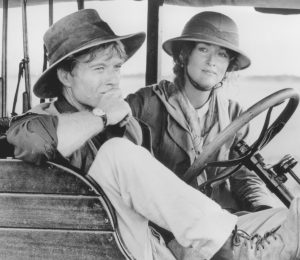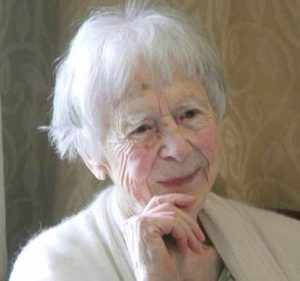Arkiv, Høytlesning
Desert Fathers 29
You can find this episode in video format here – a dedicated page – and pick it up in audio wherever you listen to podcasts. On YouTube, the full range of episodes can be found here.
An elder said regarding one of the brothers that he possessed a single Gospel; then that, having sold it and given the value of it for the feeding of the poor, he uttered this memorable sentence: ‘I have sold the very word that said to me: “Sell your possessions and give to the poor”’. […] A brother put a question to Abba Serapion, saying: ‘Tell me one word.’ The elder said: ‘What have I to say to you? You have taken what belongs to widows and orphans and put it on this window ledge.’ For he saw that it was full of books.
There is a scene in Sydney Pollacks’s Out of Africa, the story of Karen Blixen’s life in Kenya, that has haunted me since I first saw the film in a small-town cinema at the age of twelve. Astutely it touches a weakness of mine. The scene occurs in a club in Nairobi. It is Karen’s wedding day. Fresh out of Denmark, she has tied the knot with her flitting cousin Bror. Seeing him flirt with other women,  she flairs what is in store for her. At nighfall, she wants to set out for her farm ‘at the foot of the Ngong Hills’, so slips upstairs to change. She finds the door of a club room open. The room is lined with bookcases. Unable to resist, Karen goes in to have a look, then is surprised by the arrival of Berkeley Cole, a friend of the room’s resident, Denys Finch Hatton, the future love of Karen’s life. The role of Karen is wonderfully played by Meryl Streep, who exclaims in a mock-Danish accent: ‘Oh, I’m sorry. I’m afraid… I’m afraid you’ve caught me snyooping.’ Michael Kitchen, who plays Cole, retorts, ‘Well, it’s not my room; it’s Denys’s room, and Denys won’t mind; it’s the thing about Denys, he doesn’t mind.’ Karen says: ‘He has lovely books! Does he lend them?’ Then Berkely tells this little story: ‘We had a friend, Hopworth. He got a book from Denys, and he didn’t return it. Denys was furious. I said to Denys, “You wouldn’t lose a friend for the sake of a silly book, would you?” And he said, “No! But he has, hasn’t he?”’
she flairs what is in store for her. At nighfall, she wants to set out for her farm ‘at the foot of the Ngong Hills’, so slips upstairs to change. She finds the door of a club room open. The room is lined with bookcases. Unable to resist, Karen goes in to have a look, then is surprised by the arrival of Berkeley Cole, a friend of the room’s resident, Denys Finch Hatton, the future love of Karen’s life. The role of Karen is wonderfully played by Meryl Streep, who exclaims in a mock-Danish accent: ‘Oh, I’m sorry. I’m afraid… I’m afraid you’ve caught me snyooping.’ Michael Kitchen, who plays Cole, retorts, ‘Well, it’s not my room; it’s Denys’s room, and Denys won’t mind; it’s the thing about Denys, he doesn’t mind.’ Karen says: ‘He has lovely books! Does he lend them?’ Then Berkely tells this little story: ‘We had a friend, Hopworth. He got a book from Denys, and he didn’t return it. Denys was furious. I said to Denys, “You wouldn’t lose a friend for the sake of a silly book, would you?” And he said, “No! But he has, hasn’t he?”’
It happens often enough that people who generally do not cling to material things or comforts, people who do not much mind, are furiously tied to their books. Finch Hatton could manage for weeks in the bush with a single shirt, but defends with a lover’s jealousy the honour of a volume of Keats. This pattern can repeat itself in monasteries, too. A monk may get contentedly by on cold gruel, wear a tattered habit, sleep on a sagging mattress of straw; he may be gentle, patient, and kind, yet spontaneously show his teeth if anyone draws too close to his bookshelf.
There is something admirable about this. A good book is a treasure. It carries a presence. Books can be comforts in sorrow, guides in perplexity, lights in darkness. Monks have always valued books. Much monastic literature is made up of reading lists. Saint Benedict speaks for the tradition when he writes, ‘For anyone hastening on to the perfection of monastic life, there are the teachings of the Holy Fathers […]. What page, what passage of the inspired books of the Old and New Testaments is not the truest of guides for human life? What book of the holy Catholic Fathers does not resoundingly summon us along the true way to reach the Creator?’ Then he sets specific texts. The Fathers were not anti-intellectual. We have seen how the likes of Arsenius and Antony had cultivated minds. Evagrius was an outstanding scholar.
Monastic collectors of books enabled preservation through dark times of literature that would otherwise have been lost. In the Latin Middle Ages, an abbey’s books were kept in an armatorium, a word that means ‘arsenal’: books give us weapons we need to fight illusions and temptations. The Word made flesh, divine Intelligence incarnate, told us to love the Lord our God with all our heart, and with all our soul, and with all our mind. For that purpose minds must be mended and nurtured.
What Serapion condemns is not reading, but the storing of books as trophies. Our possessive tendency easily shifts from material objects to spiritual goods. Even the exalted realities given us as instruments by which to attain the truth may be turned into idols before which we pay obeisance, be it in the candle-lit austerity of a monastic cell. We may not have to follow literally the example of  the monk who sold his Gospel to feed the hungry, but it should trouble us.
the monk who sold his Gospel to feed the hungry, but it should trouble us.
Do I live by the enlightenment I seek in what I read? Or do I bask in its reflected glory, hugging it as if it were a possession due to me, present in the books that adorn my own window ledge?
I think of someone I was blessed to know who provided a counterpoint to proprietorial bibliophilia. Margaret Wileman, a fine Cambridge academic, was the university’s first female head of house. In her old age this gracious woman who lived to be, like Antony, 106, established a ritual. Anyone invited to her home for lunch or tea would be asked on leaving to choose a book from her library, any book. Knowing what books had meant in Miss Wileman’s life, I was touched by this gesture. It revealed great inner freedom. Books are given us for a time, to feed and form our lives; then they are to be passed on. The call to take all we own and give it to the needy will face us all on our deathbed. It is good to get some practice in advance.
